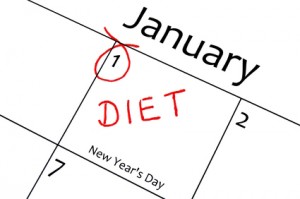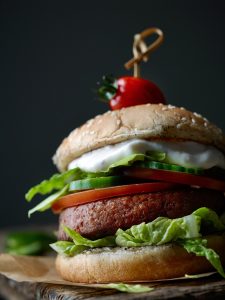Is A Vegan Diet The Secret To Permanent Weight Control?
 The new year is here, and you, like millions of other Americans, have decided this will be the year to get your weight under control. But how to do that is the question.
The new year is here, and you, like millions of other Americans, have decided this will be the year to get your weight under control. But how to do that is the question.
You have tried lots of diets over the years. You have given up sugar, then high-fructose corn syrup, then carbs in general. You have eliminated whole food groups from your diet. You have restricted your eating to between noon and 4 PM. You have eaten cabbage on Tuesdays and grapefruit on Thursdays (Just kidding about that one, but some fad diets are almost that bizarre).
You lost weight at first, but none of those diets were sustainable. You started adding back your favorite foods. Then the pounds you lost came back – and brought their friends with them.
At this point you may be desperate. You may be tempted to try one of those “magic” supplements that promises to rev up your metabolism and make those pounds melt away. Resist that temptation! Those supplements are either dangerous or worthless – sometimes both.
Or you may be tempted to sign up for one of those expensive diet programs that sends you low calorie versions of all your favorite junk foods. Don’t waste your money. You don’t really need more highly processed food in your diet. And you aren’t learning healthier food choices.
But what if…
…you could rev up your metabolism just by eating a healthy diet?
…you could lose weight naturally without counting calories or reducing portion sizes?
…you could keep most of the weight off permanently?
The study (H Kahleova et al, JAMA Network Open.2020; 3(11): e2025454) I will review today says there is diet that does all of these things. It is not the latest, greatest fad diet. In fact, it has been around for years. It is called the vegan diet.
How Was The Study Done?
 This was a small, but very well-designed, study. It enrolled 244 obese (average BMI = 33), middle aged (average age = 54) subjects (87% female, 48% white). They were randomly assigned to a vegan diet or control diet and followed for 16 weeks.
This was a small, but very well-designed, study. It enrolled 244 obese (average BMI = 33), middle aged (average age = 54) subjects (87% female, 48% white). They were randomly assigned to a vegan diet or control diet and followed for 16 weeks.
The control group was told not to change their diet and exercise routine.
The vegan group was also told not to change their exercise routine. In addition, they were given printed materials and attended weekly classes that provided detailed instructions and cooking demonstrations to help them follow a vegan diet.
The vegan diet consisted of fruits, vegetables, whole grains, and legumes with no animal products or added fats. 75% of the calories came from carbohydrate, 15% from protein, and 10% from fat.
The diets of both groups were assessed by a 3-day dietary recall at the beginning of the study and 16 weeks later, at the end of the study. In addition, dietitians made unannounced telephone calls at random times during the week and weekends to assess the participant’s adherence to the diet.
In the vegan diet group, mean intake of carbohydrate and fiber increased, while intake of fat, protein, and cholesterol decreased. There was no significant change in intake in the control group.
The other parameters measured at the beginning of the study and week 16 were:
- Body composition:
-
- Weight and BMI (a measure of obesity).
-
- Fat mass and lean muscle mass.
-
- Belly fat.
-
- Fat stores in liver and muscle (accumulation of fat stores in the liver and muscle is associated with insulin resistance).
- Parameters of blood sugar control and insulin resistance:
-
- Fasting blood glucose and hemoglobin A1c levels were measured.
-
- Insulin secretion and blood glucose levels were measured during a 3-hour oral glucose tolerance test. Insulin secretion was used as a measure of insulin resistance, and blood glucose levels were used as a measure of insulin sensitivity (Note: This is a very simple explanation of complex calculations.)
- Lipid Levels:
-
- Total cholesterol.
-
- HDL and LDL cholesterol.
A Vegan Diet And Weight Loss
 The study results were impressive:
The study results were impressive:
- The vegan group lost 14 pounds, while the control group lost only 1 pound. There were two reasons for the greater weight loss in the vegan group:
-
- The vegan group decreased their caloric intake by almost 500 calories per day. This was most likely due to the lower caloric density (calories per serving) of plant foods.
In other words, the vegan group consumed fewer calories without focusing on weight loss or portion size. They ate until they were full and consumed fewer calories in the process. Isn’t this what everyone wants from a weight loss diet?
-
- The thermic effect (calories burned due to digestion) of the food they ate increased by 14% in the vegan group. This is because it requires more energy to digest foods when your digestive system has to break down the cellular matrix found in unprocessed plant foods.
In other words, the vegan group burned more calories every day just by eating healthy foods. No other diet can promise this.
2) Fat mass decreased by 10% (9 pounds) in the vegan group but was unchanged in the control group
3) Lean body mass (muscle mass) decreased by 1 pound in the control group and 4.6 pounds in the vegan group. There are two important observations here:
-
- All the weight loss in the control group came from muscle.
-
- 33% of the weight loss in the vegan group came from muscle. This is the only negative outcome from this study and is likely due to the decreased protein intake in the vegan group. Previous studies suggest this loss of lean body mass could be prevented by increasing the protein content of the diet with a plant-based protein supplement.
4) Belly fat decreased by 15%, liver fat was decreased by 31%, and muscle fat was decreased by 19% in the vegan group. All three parameters were unchanged in the control group.
vegan group. All three parameters were unchanged in the control group.
-
- This is perhaps the most significant observation from these studies since these are the three deadliest forms of fat in our bodies. Any diet that significantly reduces these forms of fat is likely to dramatically improve our health.
-
- These parameters have not been measured in most studies of other weight loss diets, so we have no idea whether other weight loss diets have this effect.
5) Fasting blood glucose decreased by 11%, insulin resistance decreased by 40%, and insulin sensitivity increased by 22%. These parameters were unchanged in the control group.
-
- Note: While insulin resistance and insulin sensitivity are opposite ways of measuring the same phenomenon, they were measured in different ways in this study. That is why the percentage change was different for these two parameters. The important thing is that both parameters changed by a significant percentage in a direction that reduces the risk of type 2 diabetes.
-
- These data show that just 16 weeks on a vegan diet is sufficient to significantly reduce the risk of developing type 2 diabetes. Previous studies have shown that a vegan diet can reverse type 2 diabetes for many people.
6) Total cholesterol decreased by 11% and LDL cholesterol decreased by 16%. Both parameters were unchanged in the control group.
Is A Vegan Diet The Secret To Permanent Weight Loss?
As I said, the results of this study are impressive. But you have probably heard similar claims for other diets like keto, paleo, etc. To put this into context for you I am going to discuss “The Truth (about weight loss diets) Nobody Talks About” and The Questions (about weight loss diets) Nobody Asks”.
 The Truth Nobody Talks About: Why are there so many conflicting claims about weight loss diets? They can’t all work, or can they? Here is the truth nobody talks about.
The Truth Nobody Talks About: Why are there so many conflicting claims about weight loss diets? They can’t all work, or can they? Here is the truth nobody talks about.
If you just focus on short term weight loss and improvement in health parameters like cholesterol and blood sugar levels, the very low fat vegan diet and the very low carb keto diet give virtually identical results.
That statement is true for any restrictive diet, but I chose the vegan and keto diets because they are as different as any two diets can be. That means you can forget all the scientific-sounding mumbo-jumbo about why each diet is best and focus instead on what they have in common. Here is what they have in common.
- They all compare themselves to the typical American diet. The American diet is high in saturated fat, high in sugar, high in refined carbs, and high in junk foods. Almost any diet is better than the typical American diet!
Unfortunately, none of these diets compare themselves to each other, so we don’t know which is best. We just know that all of them are better than the typical American diet.
- All of them are whole food diets. Any diet that cuts out sodas, junk foods, and highly processed foods will result in weight loss and better health.
- All of them are restrictive diets. Some restrict sugar. Others restrict fat. Some eliminate particular foods. Others eliminate food groups. Some restrict the time of day you can eat. When you do any of these things you are forced to focus on what you eat.
And when you focus on what you eat, you lose weight. That is why diets that force you to count calories, count carbs, or keep a food journal are successful.
Don’t misunderstand me. Although the vegan and low carb diets have not been directly compared in clinical trials, vegan diets may have some unique benefits that other diets do not. For example, this study shows that:
- Because of the low caloric density of unprocessed plant foods, you can eat more food and consume fewer calories on a vegan diet. You don’t get this benefit from low carb diets. They are high in fat and have, therefore, a high caloric density.
- Digestion of unprocessed plant foods increases your metabolic rate. This benefit also doesn’t exist for low carb diets. They contain less unprocessed plant foods than a vegan diet.
- Belly fat, liver fat, and muscle fat are all decreased in just 16 weeks with a vegan diet. This may occur for other diets. But most studies of other diets have not looked at these parameters, so we don’t know if they have this benefit.
 The Questions Nobody Is Asking: Since all these diets result in short-term weight loss, there are two questions we should be asking.
The Questions Nobody Is Asking: Since all these diets result in short-term weight loss, there are two questions we should be asking.
- Which of these diets are healthy long term? Numerous studies have shown people who consume vegan diets and other primarily plant-based diets for 10, 20, or 30 years weigh less and have a lower incidence of heart disease, diabetes, and some cancers than people who consume the typical American diet.
Although the Atkins diet has been around for more than 50 years, there is still no evidence that the Atkins diet or other meat-based low carb diets are healthy long term. I have summarized these studies in my book, “Slaying The Food Myths”.
2) What happens when you get tired of the restrictions in these diets and start adding back a few of your favorite foods? If you start with a vegan diet and add a little dairy, eggs, and meat to it, you end up with a semi-vegetarian diet. People following a semi-vegetarian diet weigh less and are healthier than people consuming the typical American diet.
Keto diets are high in meat and saturated fat. If you add carbs, even healthy carbs, to that diet, you end up with the typical American diet, which is characterized by weight gain and poor health.
 One Final Thought: Big Food has noticed that many Americans want to eat vegan but still crave the taste and convenience of their favorite foods. Big Food has been only too happy to oblige with a wide selection of highly processed “vegan” foods. Avoid these foods like the plague!
One Final Thought: Big Food has noticed that many Americans want to eat vegan but still crave the taste and convenience of their favorite foods. Big Food has been only too happy to oblige with a wide selection of highly processed “vegan” foods. Avoid these foods like the plague!
I have discussed the shortcomings of the “vegan” burgers found in your local supermarkets and fast food restaurants in a recent issue of “Health Tips From the Professor”.
The biggest problem with all these “vegan” food substitutes is that they are highly processed foods. The benefits of a vegan diet come from eating unprocessed plant foods. None of us need more highly processed foods in our diet.
Of course, it isn’t just vegan food substitutes. Any hope that the Atkins diet might have been healthy evaporated with the advent of “Atkins” processed foods. Now I am starting to see the same trend with “keto” and “paleo” foods.
The Bottom Line
The new year is here, and you, like millions of other Americans, have decided this will be the year to get your weight under control. But how to do that is the question.
You have tried lots of diets over the years. You have given up sugar, then high-fructose corn syrup, then carbs in general. You have eliminated whole food groups from your diet. You have restricted your eating to between noon and 4 PM. You have eaten cabbage on Tuesdays and grapefruit on Thursdays (Just kidding about that one, but some fad diets are almost that bizarre.
You lost weight at first, but none of these diets were sustainable. You started adding back your favorite foods. Then the pounds you lost came back – and brought their friends with them.
But what if…
…you could rev up your metabolism just by eating a healthy diet?
…you could lose weight naturally without counting calories or reducing portion sizes?
…you could keep most of the weight off permanently?
We know people who eat a vegan diet for 10, 20, or 30 years weigh less and are healthier than people consuming the typical American diet. Could the vegan diet be the diet you have been looking for?
The study I review this week was designed to answer this question. The investigators randomly assigned obese, middle-aged Americans, to follow either a vegan diet for 16 weeks or to continue eating their typical American diet.
The study results were impressive:
- The vegan group lost 14 pounds, while the control group lost only 1 pound. There were two reasons for the greater weight loss in the vegan group:
-
- The vegan group decreased their caloric intake by almost 500 calories per day. This was most likely due to the lower caloric density (calories per serving) of plant foods.
In other words, the vegan group consumed fewer calories without focusing on weight loss or portion size. They ate until they were full and consumed fewer calories in the process. Isn’t this what everyone wants from a weight loss diet?
-
- The thermic effect (calories burned due to digestion) of the food they ate increased by 14% in the vegan group. This is because it requires more energy to digest foods when your digestive system has to break down the cellular matrix found in unprocessed plant foods.
In other words, the vegan group burned more calories every day just by eating healthy foods. No other diet can promise this.
- Fat mass decreased by 10% (9 pounds) in the vegan group but was unchanged in the control group
- Belly fat decreased by 15%, liver fat was decreased by 31%, and muscle fat was decreased by 19% in the vegan group. All three parameters were unchanged in the control group.
-
- This is perhaps the most significant observation from these studies since these are the three deadliest forms of fat in our bodies. Any diet that significantly reduces these forms of fat is likely to dramatically improve our health.
-
- These parameters have not been measured in most studies of other weight loss diets, so we have no idea whether other weight loss diets have this effect.
- Fasting blood glucose decreased by 11%, insulin resistance decreased by 40%, and insulin sensitivity increased by 22%. These parameters were unchanged in the control group.
-
- These data show that just 16 weeks on a vegan diet is sufficient to significantly reduce the risk of developing type 2 diabetes.
- Total cholesterol decreased by 11% and LDL cholesterol decreased by 16%. Both parameters were unchanged in the control group.
For more details and a more in-depth comparison of the vegan diet with other popular diets read the article above.
These statements have not been evaluated by the Food and Drug Administration. This information is not intended to diagnose, treat, cure or prevent any disease.
